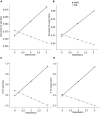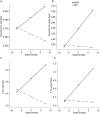Widowhood Impairs Emotional Cognition Among Elderly
- PMID: 35173602
- PMCID: PMC8841410
- DOI: 10.3389/fnagi.2021.808885
Widowhood Impairs Emotional Cognition Among Elderly
Abstract
Background: The negative impacts of spousal bereavement on the emotional health of the elderly (e.g., depression and anxiety) have been revealed. However, whether widowhood impairs emotional cognition among the elderly is less known. The purpose of this study is to reveal the emotional cognitive deficits among the widowed elderly.
Methods: In this study, we recruited 44 widowed elderly (WE) and 44 elder couples (non-widowed elderly, NWE) and examined their emotional cognition including attention and visual working memory, which were measured by the visual search task and delayed-match-to-sample task, respectively. Three kinds of emotional faces (i.e., sad, angry, and happy) were adopted as the attentional or mnemonic targets.
Results: It revealed that WE had a general deficit in search efficiency across emotional types, while they showed mnemonic deficits in negative faces but not positive faces. Furthermore, the modeling analysis revealed that the level of depression or state anxiety of the elderly moderated the effects of widowhood on the deficits of mnemonic processing, i.e., the deficits were only evident among WE with the high level of depression or state anxiety.
Conclusion: These findings reveal the attentional deficits in sad, angry, and happy faces and the mnemonic deficits in sad and angry faces among elderly who suffer from widowhood and point out the important role of emotional problems such as depression and state anxiety in modulating these emotional cognitive deficits.
Keywords: attention; cognitive deficit; emotional cognition; visual working memory; widowed elderly.
Copyright © 2022 Bi, Kou, Kong and Shao.
Conflict of interest statement
The authors declare that the research was conducted in the absence of any commercial or financial relationships that could be construed as a potential conflict of interest.
Figures



Similar articles
-
Cognitive deficits for facial emotions among male adolescent delinquents with conduct disorder.Front Psychiatry. 2022 Aug 23;13:937754. doi: 10.3389/fpsyt.2022.937754. eCollection 2022. Front Psychiatry. 2022. PMID: 36081455 Free PMC article.
-
Too bad: Bias for angry faces in social anxiety interferes with identity processing.Neuropsychologia. 2016 Apr;84:136-49. doi: 10.1016/j.neuropsychologia.2016.02.005. Epub 2016 Feb 13. Neuropsychologia. 2016. PMID: 26878979
-
Deficient inhibition of return for emotional faces in depression.Prog Neuropsychopharmacol Biol Psychiatry. 2009 Aug 31;33(6):921-32. doi: 10.1016/j.pnpbp.2009.04.012. Epub 2009 Apr 23. Prog Neuropsychopharmacol Biol Psychiatry. 2009. PMID: 19394388
-
Attentional processes during emotional face perception in social anxiety disorder: A systematic review and meta-analysis of eye-tracking findings.Prog Neuropsychopharmacol Biol Psychiatry. 2021 Dec 20;111:110353. doi: 10.1016/j.pnpbp.2021.110353. Epub 2021 May 15. Prog Neuropsychopharmacol Biol Psychiatry. 2021. PMID: 34000291
-
Functional atlas of emotional faces processing: a voxel-based meta-analysis of 105 functional magnetic resonance imaging studies.J Psychiatry Neurosci. 2009 Nov;34(6):418-32. J Psychiatry Neurosci. 2009. PMID: 19949718 Free PMC article. Review.
Cited by
-
The Impacts of Spirituality and Religious Participation on the Emotional Well-Being of Widowed Older Adults in Southeast Nigeria.Innov Aging. 2023 Nov 15;8(4):igad128. doi: 10.1093/geroni/igad128. eCollection 2024. Innov Aging. 2023. PMID: 38572404 Free PMC article.
-
The association between widowhood duration and depressive symptoms among Chinese older adults: mediation role of sleeping duration and dietary diversity.Eur J Ageing. 2025 Aug 2;22(1):38. doi: 10.1007/s10433-025-00873-x. Eur J Ageing. 2025. PMID: 40753317 Free PMC article.
-
Associations between widowhood status/duration, depression, and cognitive function among community-dwelling Indians age 60 years or older: Exploration of sex and residential factors.Soc Psychiatry Psychiatr Epidemiol. 2025 Jun 27. doi: 10.1007/s00127-025-02950-z. Online ahead of print. Soc Psychiatry Psychiatr Epidemiol. 2025. PMID: 40579574
-
Prediction model of quality of life using the decision tree model in older adult single-person households: a secondary data analysis.Front Public Health. 2023 Aug 31;11:1224018. doi: 10.3389/fpubh.2023.1224018. eCollection 2023. Front Public Health. 2023. PMID: 37719721 Free PMC article.
References
-
- Baddeley A. (1986). Working memory. New York, NY: Clarendon Press/Oxford University Press.
LinkOut - more resources
Full Text Sources

